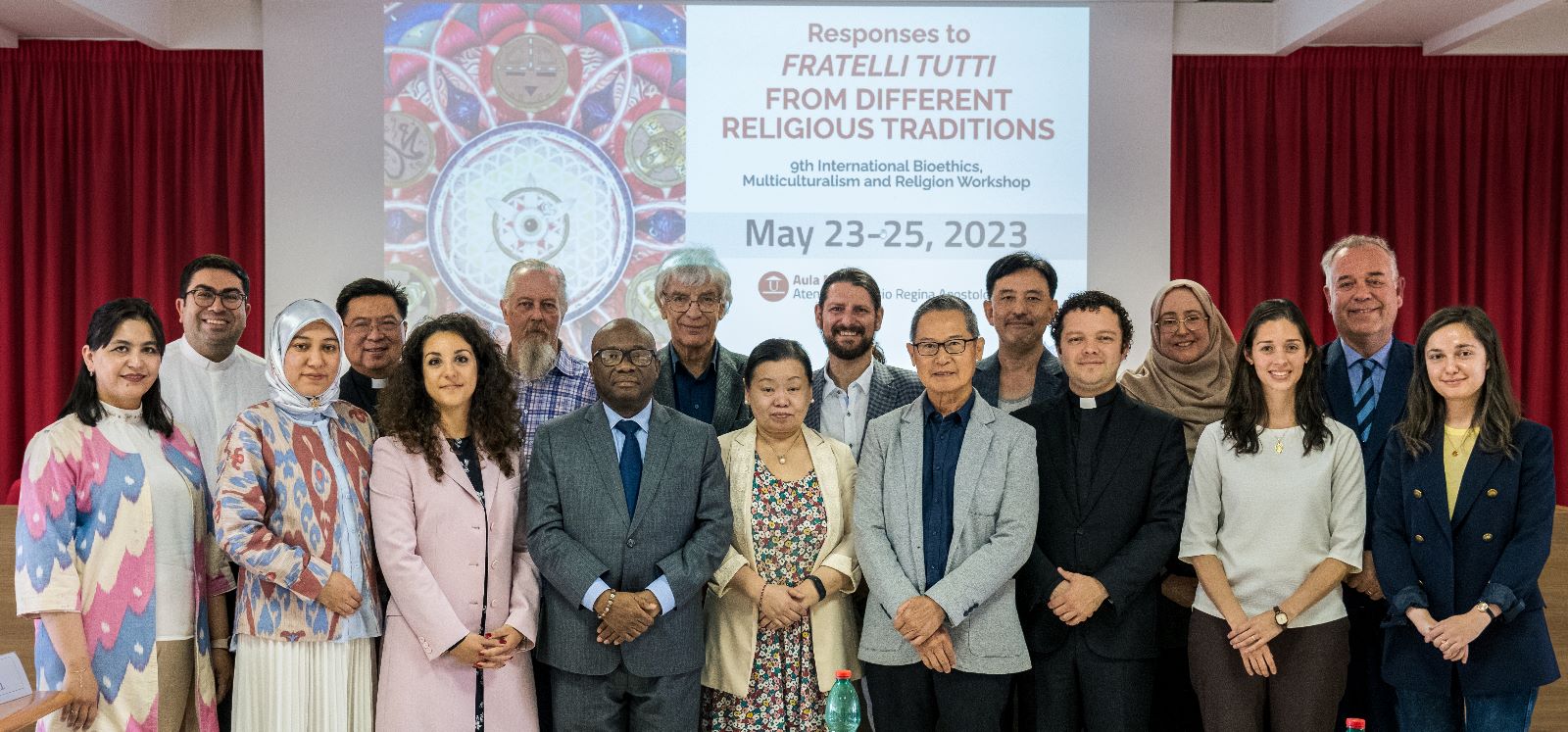9th International Bioethics, Multiculturalism and Religion Workshop
by Allister Lee, licentiate student in bioethics.
In his 2020 encyclical, Fratelli Tutti, Pope Francis points out the many social issues of the contemporary age which could be characterised by the absence of communal and social purpose and selfish indifference towards the common good. However, the Holy Father also offers a hopeful message and suggests that the world should encounter itself through renewed dialogue and friendship. The last chapter of the encyclical examined the role of religions in fostering fraternity instead of polarization. As a response to the Pope’s call to dialogue, the UNESCO Chair in Bioethics and Human Rights, established at Faculty of Bioethics of the Pontifical Athenaeum Regina Apostolorum and Faculty of Law of Università Europea di Roma, organised a two-day workshop to study the document in light of other different traditions, including Islam, Judaism, Greek Orthodoxy, Buddhism, Confucianism, and Hinduism.
The workshop began with the keynote speaker, Prof. Edmund Kwok and Dr. Christine Lai, who focused on the encyclical’s discussion of contemporary global politics concerning integral human development and addressed the Holy Father’s vision of a “better kind of politics” through a universal fraternity that is rooted in the common good, love, mercy, and hope. This was followed by Fr. Sameer Advani, LC, who contextualised Fratelli Tutti and the Catholic Church’s commitment to interreligious dialogue as a product of the Second Vatican Council, and pointed out that such dialogue is “primarily anthropological, and only secondarily theo-logical, in nature.” He highlights that because religion is an essential part of human existence and experience, the fundamental questions that interreligious dialogue seeks to answer are consequently also deeply human, such as the nature and purpose of man, and morality. In his presentation, Fr. Adavani, LC, argues that even though the Catholic faith conceives truth as singular and absolute, it is within the human condition that our knowledge and understanding of the truth is limited; henceforth, it is only by the breaking down of one’s preconceived notions of truth through dialogue with the “other” can one attain a deeper, and often hidden truth.
The Holy Father’s concept of what could be called a universal fraternity was examined by some scholars in this workshop and brought forward the tension between particularism and universalism. In his presentation, Dr. David Heyd from the Hebrew University of Jerusalem points out that this philosophical tension is reflected socio-politically in the divide between cosmopolitanism and statism, and religiously in the way that Judaism differs from Christianity where it approaches issues from the particular to the universal, while the latter does so in a reversed manner. The idea of cosmopolitanism was also mentioned by Dr. Ellen Zhang from the University of Macau about the “ethics of hospitality” and Buddhism. The speaker presented the Buddhist idea of the interconnectedness of the world by recognizing the universality of suffering and vulnerability, which in turn creates a demand for the virtues of loving-kindness and compassion. However, as both Dr. Heyd and Dr. Zhang questioned in their presentations, “Are feelings of love and compassion sufficient enough to develop rational moral propositions in favour of global solidarity and social friendship?” Undoubtedly, these affective notions can be slightly precarious for long-lasting social cohesion and unity, but they can often be a powerful impetus for open dialogue between people to (re)discover fundamental truths that forge social friendships and fosters a sense of universal fraternity.
Dialogue – as Dr. Chris Durante from St Peter’s University in New York reminded the participants through the words of the Greek Orthodox leaders, “takes place in all our encounters, personal, social, or political, and must always be extended to those who adhere to religions different from ours” where “truth is not afraid of dialogue.” As such, Dr. Durante in his presentation stressed the importance of relationality with others in the world and avoiding bigoted forms of tribalism and exclusivism. On the other hand, Luzita Ball from the Islamic Foundation for Ecology and Environmental Science (IFEES) presented the Islamic tradition which approaches the topic of interreligious dialogue in a more legalistic manner in comparison to its Orthodox counterparts, while remaining committed to the ideals of unity and solidarity for the downtrodden. In this contemporary world, even though the East and West have been ever brought closer to each through technological means, international conflicts have created a vast space for dialogue and mutual understanding. However, in his presentation, Dr. John Lunstroth from the University of Houston brought to attention the historical relationship between the two hemispheres that were characterized by admiration and a call to “rectify each other’s errors and supplement mutual deficiencies” by learning from each other. And concerning the dialogue between East and West, Dr. Ruiping Fan from the City University of Hong Kong added that to conduct authentic social dialogue and foster fraternity, there is an imperative to first acknowledge the differences of “people’s particular cultural rituals and practices”.
On a final note, the “fruitful exchange” that occurred throughout this workshop inevitably involved contentions of an intellectual nature at times. However, they were always denoted by the underlying friendship that was built through shared moments such as the day trip to Assisi on the last day of the workshop, and a deep desire to seek the truth that unites rather than divides. And as such, I firmly believe that the Pope’s encyclical is a reaffirmation and encouragement to the continuous efforts of the UNESCO Chair in Bioethics and Human Rights to foster constructive interreligious dialogue which would bring the universal fraternity closer to each other.




